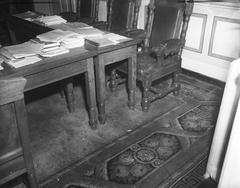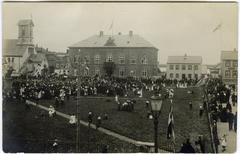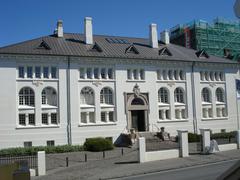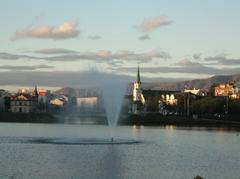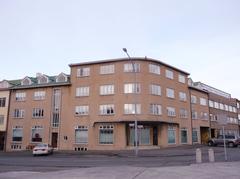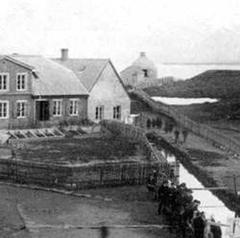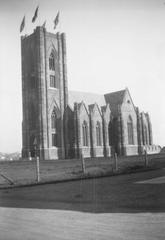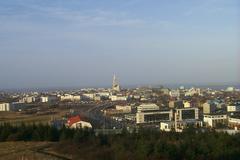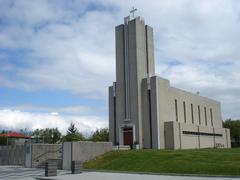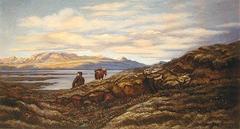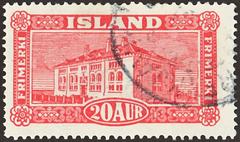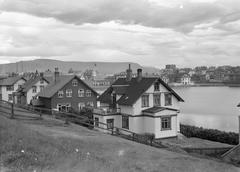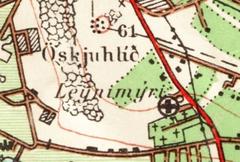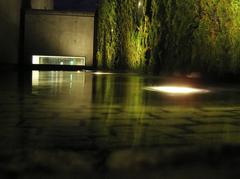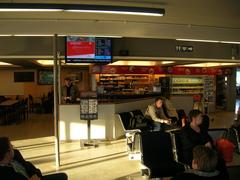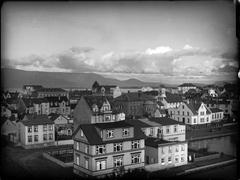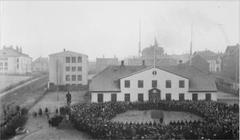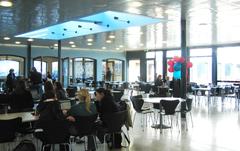Perlan Reykjavik Visiting Hours, Tickets, and Historical Significance Guide
Date: 15/06/2025
Introduction to Perlan Reykjavik: History and Cultural Importance
Perlan, Reykjavík’s striking architectural landmark atop Öskjuhlíð hill, stands as a vivid testament to Iceland’s unique blend of geothermal ingenuity, adaptive design, and cultural storytelling. Initially constructed during the mid-20th century as six massive hot water tanks for Reykjavík’s pioneering district heating system, Perlan was transformed in the late 1980s into a cultural and scientific center. The addition of its iconic glass dome unified the structure visually and became a symbol of Iceland’s commitment to transparency, sustainability, and innovative use of natural resources (Wikipedia; Adventures.is).
Since opening to the public on June 21, 1991, Perlan has offered immersive exhibitions, such as the Wonders of Iceland, and breathtaking 360° views from its observation deck. Its features include a 100-meter indoor ice cave created from authentic ice and snow, as well as the Áróra Planetarium, which blends technology with Icelandic folklore surrounding the Northern Lights (Introducing Iceland; World Tourism). Perlan embodies Reykjavík’s philosophy of adaptive reuse, turning essential infrastructure into a beacon of cultural and environmental education (RE.is; EAA).
This guide explores Perlan’s rich heritage, architectural innovation, practical visitor information, and nearby attractions, ensuring you get the most out of your visit to this fusion of Icelandic nature and modern ingenuity.
Table of Contents
- Origins and Historical Development
- Architectural Vision and Design
- Evolution of Function and Cultural Role
- Visitor Information: Hours, Tickets, Accessibility, and Tips
- Nearby Historical Sites and Attractions
- Visuals and Media Suggestions
- FAQ: Common Visitor Questions
- Symbolism and Impact on Reykjavík’s Identity
- Notable Facts and Figures
- Plan Your Visit
Origins and Historical Development
Perlan (“The Pearl” in Icelandic) is one of Reykjavík’s most recognizable landmarks, rooted in the city’s geothermal heritage. The mid-20th-century construction of six vast hot water tanks atop Öskjuhlíð hill was a milestone in Reykjavík’s municipal heating strategy, each tank capable of storing 4 million liters of geothermal water (Wikipedia; Adventures.is).
Seeing the potential of the site’s panoramic location, Reykjavík’s city council commissioned architect Ingimundur Sveinsson in the late 1980s to transform the tanks into a public destination. The vision resulted in a glass-domed structure uniting the tanks, culminating in Perlan’s opening on June 21, 1991 (Iceland Lovers).
Architectural Vision and Design
The Glass Dome and Structural Innovation
Perlan’s defining glass dome rises 25.7 meters high and spans 36 meters in diameter (Iceland Lovers). Architecturally futuristic, the dome unites the six water tanks and symbolizes transparency and innovation (Adventures.is). Four tanks retain their original function, while two have been adapted — one houses the indoor ice cave; the other contains the planetarium (Wikipedia; Introducing Iceland).
Integration with the Landscape
Perlan’s placement atop Öskjuhlíð hill provides sweeping views of Reykjavík, the surrounding mountains, and the Atlantic Ocean. The circular form and reflective dome mirror both the contours and the shifting sky, blending built and natural environments (EAA).
Sustainability and Adaptive Reuse
Rather than demolishing the water tanks, Perlan’s design preserved and transformed them, exemplifying sustainable development. The continued use of geothermal energy and the educational focus on natural resources reinforce its environmental mission (Adventures.is; RE.is).
Evolution of Function and Cultural Role
From Utility to Cultural Hub
Initially, Perlan’s glass dome featured a revolving restaurant and an ice cream parlour, quickly becoming a local favorite (Adventures.is). As its role evolved, Perlan shifted focus to education and exhibitions, now housing the Wonders of Iceland and the Áróra Planetarium.
Exhibition Spaces and Interactive Experiences
The Wonders of Iceland exhibition immerses visitors in Iceland’s geology, glaciers, volcanoes, and wildlife through hands-on experiences (Introducing Iceland). The indoor ice cave, made from real snow and ice, offers a glacier walk in the heart of the city. The Áróra Planetarium weaves together science, art, and folklore to explain the Northern Lights (Wikipedia). Additional features include a replica of the Látrabjarg bird cliffs and the Forces of Nature exhibit (Adventures.is).
Observation Deck and City Views
The fourth-floor deck delivers a 360-degree panorama: on clear days, see as far as Snæfellsjökull glacier and the Reykjanes Peninsula. The deck is a favorite for photography and city views (EAA; Adventures.is).
Visitor Information: Hours, Tickets, Accessibility, and Travel Tips
Visiting Hours
- General Hours: Daily, 9:00 AM–10:00 PM (may vary seasonally; verify on Perlan’s website)
- Exhibition Entry: Last admission typically one hour before closing.
Ticket Information
- Adults: 4,900 ISK
- Youth (6–17): 2,900 ISK
- Children under 6: Free
- Family/group discounts: Available
- Purchase: Online (recommended) or at entrance (Perlan Tickets)
Accessibility
Perlan is fully accessible: elevators, ramps, wheelchair-friendly restrooms, and assistance available (Perlan Accessibility).
Travel Tips
- Transport: Bus routes 13 and 18, taxis, car (free parking), or a 30–40 min walk from downtown (Strætó)
- Best Time: Mornings and late afternoons for fewer crowds; clear weather for best views.
- Dress Code: Layered clothing; coats/gloves for the ice cave (provided on-site).
Nearby Reykjavík Historical Sites and Attractions
Enhance your visit by exploring nearby sites:
- Hallgrímskirkja Church: Reykjavík’s iconic church and observation tower.
- Harpa Concert Hall: Modern architecture and cultural events.
- National Museum of Iceland: Icelandic history and artifacts.
- Reykjavík Botanical Gardens: Family-friendly, with walking trails.
- Laugardalur Park: Botanical gardens, zoo, and pools.
Visuals and Media Suggestions
For optimal engagement and SEO:
- High-resolution images: Perlan’s dome, ice cave, observation deck, exhibitions
- Alt tags: “Perlan Reykjavik glass dome landmark”, “Ice cave exhibit at Perlan”, “Panoramic view from Perlan observation deck”
- Interactive map: Perlan’s location relative to downtown Reykjavík
- Virtual tour or video: Showcase Perlan’s highlights
FAQ: Common Visitor Questions
Q: What are Perlan’s opening hours?
A: 9:00 AM–10:00 PM daily; check Perlan’s website for updates.
Q: How much do tickets cost?
A: Adults 4,900 ISK; youth (6–17) 2,900 ISK; children under 6 free; discounts for families/groups.
Q: Is Perlan wheelchair accessible?
A: Yes, including all exhibitions, restrooms, and dining areas.
Q: Are there guided tours?
A: Yes, in multiple languages; book in advance for groups (Perlan Group Visits).
Q: Can I see the Northern Lights at Perlan?
A: You can experience them virtually via the Áróra Planetarium.
Q: Is Perlan suitable for children?
A: Absolutely — interactive exhibits, family tickets, and free admission for under 6.
Symbolism and Impact on Reykjavík’s Identity
Perlan’s transformation from functional water tanks to a beloved cultural landmark embodies Reykjavík’s spirit of innovation and sustainability. It is a symbol of the city’s embrace of adaptive reuse, technological progress, and environmental stewardship. As a gathering place and center for learning, Perlan connects residents and visitors alike to Iceland’s natural wonders and evolving identity (RE.is; Iceland Lovers).
Notable Facts and Figures
- Opening Date: June 21, 1991
- Architect: Ingimundur Sveinsson
- Height (dome): 25.7 meters
- Dome Diameter: 36 meters
- Number of Tanks: 6 (originally 4 million liters each)
- Key Features: Glass dome, 100-meter ice cave, Áróra Planetarium, exhibitions, panoramic observation deck
- Location: Öskjuhlíð hill (Wikipedia; Adventures.is)
Plan Your Visit
To make the most of your trip:
- Book tickets online via Perlan’s official site
- Check for special exhibitions and events
- Allow 2–4 hours for full exploration
- Enjoy dining with panoramic views
- Explore nearby historical and cultural sites
Download the Audiala app for interactive guides, updates, and travel tips.
Summary: Key Points and Visitor Tips
Perlan is more than a landmark; it is a vivid symbol of Reykjavík’s commitment to innovation, sustainability, and cultural vitality. Visitors can engage with Iceland’s geology, climate, and folklore through interactive exhibitions, enjoy 360° city views, and explore nearby attractions. Its accessible design, family-friendly amenities, and environmental focus make Perlan a must-see for all visitors (Wikipedia; Adventures.is; Iceland Lovers; PlanPackExplore). For up-to-date hours, ticketing, and events, consult Perlan’s official website and enhance your experience with the Audiala app.
References
- Perlan, Wikipedia
- Perlan Attractions, Adventures.is
- Visit Museum Perlan Reykjavík, Iceland Lovers
- Wonders of Iceland Exhibition, Introducing Iceland
- Architectural Highlights in Iceland, EAA
- Perlan Museum in Reykjavík, RE.is Blog
- Perlan Museum Wonders of Iceland Planetarium Show, World Tourism
- Is Perlan Museum Worth Visiting?, PlanPackExplore
- Perlan Official Website
